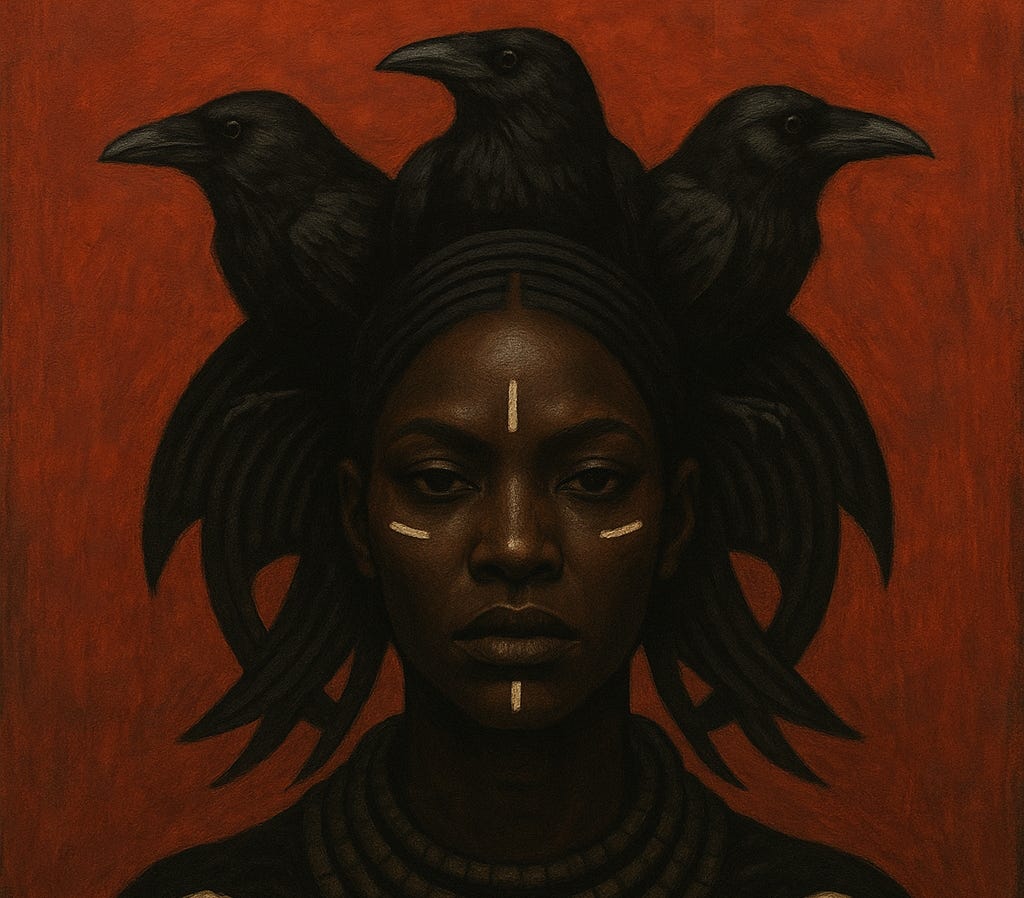African Blood
The Ritual Codes of Yugen Blakrok
“The name is written in the bones. The voice is older than the tongue.”
There are artists who make music. And there are those who perform archaeology, digging deep into the soil of our souls, conjuring (not my words, hers), decoding. Yugen Blakrok does this with surgical precision. Listening to her is less an act of consumption than one of participation. You lean in. You decipher. You remember something you never knew you knew.
“I don’t believe in your system, my thoughts are hieroglyphics.” — House of Ravens
I accidentally bumped into her music and her intentionality trapped me. If King Pinn’s I Salute You was a call to presence, a spiritual reckoning with legacy, then Yugen’s work is the crypt beneath the altar, carved with forgotten syllables. Her verses move like ancient prayers wrapped in cosmic cipher. In a world gasping for clarity, she offers shadow, and in that shadow, vision.
Born from South Africa’s underground hip-hop scene, Yugen walks the sonic edge between resistance poetry and galactic prophecy. African Blood isn’t a single track in her catalogue, but rather a spiritual current running through works like House of Ravens, Picture Box, Morbid Abacus, Carbon Form, and Medusa Complex. This post honours that current.
1. House of Ravens: Memory is Alive Here
“My feathers stain the scroll, I’m flying low where the dead things grow.”
The raven is a symbol, death, mystery, witness. In House of Ravens, Yugen builds a shrine out of sound. This isn’t nostalgia. This is ancestral forensic work, unearthing what was buried under conquest and algorithm. The house she speaks of isn’t haunted—it’s inhabited. And it calls her back.
This is African blood as archive, not the blood of violence, but of voice. The kind that stains history books only because it bleeds truth.
2. Picture Box: Surveillance, Subversion, Screen
“I navigate by star maps while you’re trapped in picture box dreams.”
This is one of her sharpest critiques of modern life. The Picture Box, our phones, our TVs, our curated identities, is not just a screen; not to freak you out but, it’s a spell. Think of the doom scrolling. The ceaseless TikTok, Facebook, Instagram clips that chew into your productive time. Binge watching Netflix. The soccer. The sport. We stare until we forget our own shape.
Yugen’s verses here are sonic grenades against passive watching. She asks: What stories are we being fed? Whose gaze is shaping our self-image? Why do we fear our own reflections?
This is African blood as mirror, fractured, yes, but still reflecting.
3. Morbid Abacus: The Mathematics of Power
“I count bones, not coins.”
There are few lines more cutting. In Morbid Abacus, Yugen replaces the abacus, the tool of commerce and calculation, with something darker. This became my favourite, until I heard Medusa Complex. She isn’t tracking wealth. She’s tracking loss. Displacement. Bodies. The brutal math of empire.
Yet she does this with cold poise, not rage. The track becomes an accounting ledger of history's unspoken debts.
This is African blood as ledger, not for capitalism, but for justice.
4. Carbon Form: Sacred Anatomy
“I’m more than carbon form, I’m fire hidden in the mold.”
This track is pure metaphysics. She tears through the illusion of materialism. We are not just bodies; we are rituals in motion. Each cell is an echo. Each breath a pattern.
Yugen places herself in a long cosmology: woman, ancestor, dust, constellation. Here, science and spirit are not opposites. They are lovers. I’ll save the detail for a Science vs Religion post. For now, absorb they lyricism
This is African blood as cosmos, stitched into time, refusing reduction.
5. Medusa Complex: Decoding the Gaze
“So the gaze became the crime, and the victim, the destroyer.”
Yugen takes the myth of Medusa, a woman made into a monster for the crime of being violated, and recodes it. The gaze that was weaponized against her becomes the site of her resurrection.
In a world terrified of powerful, intelligent, mystical Black women, Medusa Complex is more than a song. It’s a rite of reclamation. She doesn’t reject the label, she bends it. Wears it. Elevates it.
This is African blood as spell—dangerous, divine, indestructible.
What Runs Through All This?
Blood.
But not the sanitized metaphor. Not the blood of patriotism or revolution as slogan. We’re speaking here of deep blood, the kind that codes memory into the body. That makes rhythm ancestral. That makes a verse a veil between worlds.
Yugen Blakrok does not rap to be heard. She raps to remember. To raise. To warn.
She is not telling you what to think. She is showing you what is possible when language is ceremony. She made it to my list not because she’s popular, but because she has depth. You may not have heard of her, hip-hop may not be your thing, but what Yugen has to say is worth listening to, especially if like me, you’re of Negroid Descent.
She models a kind of artistry that doesn’t ask permission. It remembers who it is. She shows young African artists that global acclaim is possible without mimicry. That intelligence, mysticism, and revolution are not mutually exclusive. That poetry is a weapon sharpened by memory.
Next in Series:
Soul Power — Sampa the Great
Diasporic Return and the Politics of Self-Worth
Related Posts:


